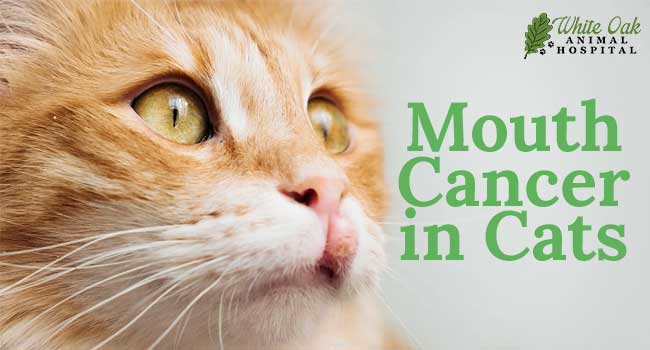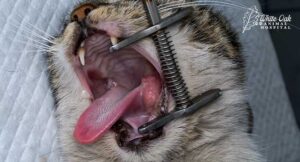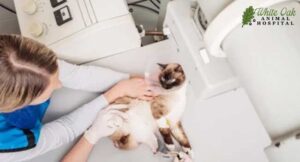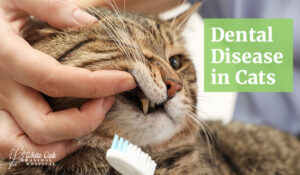
Our pets, like humans, can suffer from various dental issues, and mouth cancer in cats stands as one of the most serious among them. According to the Cornell Feline Health Center, oral cavity cancer ranks as the fourth most commonly diagnosed cancer in cats. A variety of mouth cancers exist exists in cats, each with its characteristics and severity.
Understanding the signs of mouth cancer in cats is crucial for pet owners to ensure timely intervention. Early detection is pivotal in improving treatment outcomes and enhancing the quality of life for affected felines. As responsible pet parents, staying informed about potential health risks and seeking veterinary guidance when necessary is imperative.
Understanding Mouth Cancer in Cats
 Mouth cancer in cats, also known as feline oral cancer, refers to the abnormal growth of malignant cells within the oral cavity of felines. This condition can affect various mouth parts, including the gums, tongue, roof, and throat. The most common type of mouth cancer in cats is squamous cell carcinoma (SCC), accounting for the majority of cases.
Mouth cancer in cats, also known as feline oral cancer, refers to the abnormal growth of malignant cells within the oral cavity of felines. This condition can affect various mouth parts, including the gums, tongue, roof, and throat. The most common type of mouth cancer in cats is squamous cell carcinoma (SCC), accounting for the majority of cases.
Mouth cancer poses a significant concern for cat owners because it can affect multiple aspects of their pet’s health and well-being. Left untreated, mouth cancer can lead to severe discomfort, difficulty eating or swallowing, weight loss, and even fatal complications. Moreover, oral cancer in cats may progress rapidly, making early detection and intervention critical for improving prognosis and treatment outcomes.
As responsible caregivers, cat owners need to monitor their pet’s oral health and seek prompt veterinary attention if any signs or symptoms of mouth cancer are observed. By staying informed and proactive, cat owners can play a crucial role in safeguarding their feline companions against the devastating effects of mouth cancer.
Recognizing Symptoms and Signs
Swelling or Lumps in the Mouth or Neck Region
Swelling or lumps in the mouth or neck region can signify the presence of tumors associated with mouth cancer in cats. You may notice abnormal growths or protrusions on your cat’s gums, tongue, or neck area. These lumps can vary in size and may cause discomfort or difficulty eating and swallowing. A veterinarian should examine any unusual swelling or masses to determine their underlying cause, as they could indicate serious health issues, including mouth cancer.
Unexplained Weight Loss
 Mouth cancer in cats can often manifest through unexplained weight loss. If you notice your cat losing weight without apparent reason, it could cause concern. Cats with mouth cancer may experience difficulty eating due to discomfort or pain, leading to a decrease in appetite and subsequent weight loss. While weight loss can result from various health issues, it’s essential to consider mouth cancer as a potential cause, especially if other symptoms are present.
Mouth cancer in cats can often manifest through unexplained weight loss. If you notice your cat losing weight without apparent reason, it could cause concern. Cats with mouth cancer may experience difficulty eating due to discomfort or pain, leading to a decrease in appetite and subsequent weight loss. While weight loss can result from various health issues, it’s essential to consider mouth cancer as a potential cause, especially if other symptoms are present.
Difficulty Eating or Swallowing
Cats with mouth cancer may experience difficulty eating or swallowing, often due to pain or obstruction caused by tumors in the oral cavity. You may observe your cat hesitating to eat or showing signs of discomfort while chewing. Difficulty swallowing, indicated by excessive drooling or gagging, can also signify underlying issues. If your cat exhibits reluctance or struggles while eating, it’s crucial to consult your veterinarian promptly to determine the cause and appropriate course of action.
Persistent Bad Breath
Persistent bad breath, also known as halitosis, is another common symptom of mouth cancer in cats. Oral tumors or infections can cause foul-smelling breath that doesn’t improve with regular dental care. While bad breath can occasionally result from dietary factors or dental issues, persistent halitosis in cats should prompt further investigation, as it could indicate underlying oral health problems, including mouth cancer.
Oral Bleeding or Sores
Oral bleeding or sores in the mouth are concerning symptoms that warrant immediate attention. Mouth cancer can cause bleeding gums, tongue ulcers, or open sores within the oral cavity. If you notice blood in your cat’s saliva or observe any abnormal lesions or wounds in their mouth, it’s essential to have them evaluated by a veterinarian promptly. Oral bleeding can indicate various oral health issues, including mouth cancer, which requires timely diagnosis and treatment.
Prompt veterinary attention is crucial if your cat exhibits any symptoms associated with mouth cancer. Early detection and intervention can significantly improve affected cats’ treatment outcomes and quality of life.
Diagnostic Process
 When suspecting mouth cancer in cats, the initial step involves scheduling a veterinarian consultation. During this examination, the veterinarian focuses on the oral cavity and surrounding areas to identify any visible abnormalities or signs of mouth cancer. Standard diagnostic tests include:
When suspecting mouth cancer in cats, the initial step involves scheduling a veterinarian consultation. During this examination, the veterinarian focuses on the oral cavity and surrounding areas to identify any visible abnormalities or signs of mouth cancer. Standard diagnostic tests include:
- Biopsy: Removal and analysis of a small tissue sample to determine cancerous growth and its characteristics.
- X-rays or Ultrasound: Imaging tests to visualize internal structures and detect abnormalities.
- Blood Tests: Assessment of overall health and detection of cancer-related markers.
Types of Mouth Cancer in Cats
Squamous Cell Carcinoma
The most common type of mouth cancer in cats, squamous cell carcinoma (SCC), typically affects the tissues surrounding teeth, the tongue, the roof of the mouth, the tonsils, or salivary glands. Treatment options for SCC may include surgery, radiation therapy, or chemotherapy, depending on the tumor’s size and extent.
Fibrosarcoma
Fibrosarcoma in cats destroys gums, bones, and muscles within the mouth. While less common than SCC, fibrosarcoma necessitates aggressive treatment, including surgery to remove the tumor and, in some cases, radiation therapy or chemotherapy.
Melanoma
Melanoma, originating from pigment-producing cells, can occur in the oral cavity of cats. Treatment for oral melanoma often involves surgical removal of the tumor, with additional therapies such as radiation or immunotherapy considered based on the tumor’s characteristics.
Lymphoma
Lymphoma in cats can affect the oral cavity, although it typically originates from lymphoid tissues elsewhere in the body. Treatment for oral lymphoma may involve chemotherapy to target cancer cells and manage symptoms.
Understanding the differences in prognosis and treatment for each type is crucial for veterinarians to develop tailored treatment plans. By addressing the unique characteristics of each type of mouth cancer, veterinarians can optimize treatment outcomes and provide the best care for affected cats.
 When addressing concerns about mouth cancer in cats, timely action is paramount. If you notice any concerning symptoms in your feline companion, such as unexplained weight loss, persistent bad breath, or difficulty eating, don’t hesitate to seek veterinary care. At White Oak Animal Hospital, we understand the importance of early detection and comprehensive treatment options.
When addressing concerns about mouth cancer in cats, timely action is paramount. If you notice any concerning symptoms in your feline companion, such as unexplained weight loss, persistent bad breath, or difficulty eating, don’t hesitate to seek veterinary care. At White Oak Animal Hospital, we understand the importance of early detection and comprehensive treatment options.
With over 28 years of experience and a commitment to integrative veterinary care, including TCVM Telemedicine consultations, we offer a unique approach to addressing your pet’s health needs. Our dedicated team is here to support you and your beloved cat every step of the way. Trust in White Oak Animal Hospital to provide compassionate care and tailored solutions for your pet’s well-being.
Frequently Asked Questions
What treatment options are available for cats diagnosed with mouth cancer, and what factors influence the treatment choice?
Treatment options for mouth cancer in cats may include surgery, radiation therapy, and chemotherapy. Treatment choice depends on various factors, such as the type and stage of cancer, the cat’s overall health, and the pet owner’s preferences. Dr. Damron also offers alternative cancer treatments.
What are the potential complications or side effects associated with treatment for mouth cancer in cats?
Common complications or side effects of treatment for mouth cancer in cats may include pain, discomfort, loss of appetite, and temporary or permanent changes in eating or drinking habits. Additionally, specific treatments, such as chemotherapy, may cause other systemic effects, such as nausea, vomiting, and immune system suppression.
How effective are various treatment modalities (surgery, radiation therapy, chemotherapy) for managing mouth cancer in cats?
The effectiveness of treatment modalities for managing mouth cancer in cats varies depending on several factors, including the type and stage of the cancer, the aggressiveness of the tumor, and the cat’s response to treatment. Sometimes, a combination of treatments may be recommended to achieve the best possible outcome.
Related Posts
-
What Are The Common Types Of Cat Cancer?
Cat cancer is an unfortunately common pet malady. Pets develop cancer for a variety of…
-
5 Alarming Signs of Cat Skin Cancer: Early Detection is Key
The importance of early detection in managing cat skin cancer cannot be overstated. As pet…
-
Top Dog Cancer Natural Remedies
Many natural dog cancer remedies are available today. Most dog cancer natural treatments can be…
-
Eastern and Western Cat Cancer Treatments
As cats age, they often get lumps and bumps.In veterinary medicine, these are called masses…









